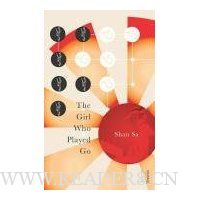基本信息·出版社:Vintage Books ·页码:288 页 ·出版日期:2006年09月 ·ISBN:009949079X ·International Standard Book Number:009949079X ·条形 ...
| 商家名称 |
信用等级 |
购买信息 |
订购本书 |
|
|
 |
The Girl Who Played Go |
 |
|
 |
The Girl Who Played Go |
 |

基本信息·出版社:Vintage Books
·页码:288 页
·出版日期:2006年09月
·ISBN:009949079X
·International Standard Book Number:009949079X
·条形码:9780099490791
·EAN:9780099490791
·装帧:简装
·正文语种:英语
·丛书名:Vintage East
内容简介 In a remote Manchurian town in the 1930s, a sixteen-year-old girl is more concerned with intimations of her own womanhood than the escalating hostilities between her countrymen and their Japanese occupiers. While still a schoolgirl in braids, she takes her first lover, a dissident student. The more she understands of adult life, however, the more disdainful she is of its deceptions, and the more she loses herself in her one true passion: the ancient game of go.
Incredibly for a teenager–and a girl at that–she dominates the games in her town. No opponent interests her until she is challenged by a stranger, who reveals himself to us as a Japanese soldier in disguise. They begin a game and continue it for days, rarely speaking but deeply moved by each other’s strategies. As the clash of their peoples becomes ever more desperate and inescapable, and as each one’s untold life begins to veer wildly off course, the girl and the soldier are absorbed by only one thing–the progress of their game, each move of which brings them closer to their shocking fate.
In
The Girl Who Played Go, Shan Sa has distilled the piercing emotions of adolescence into an engrossing, austerely beautiful story of love, cruelty and loss of innocence.
From the Hardcover edition. 作者简介 Shan Sa was born in 1972 in Beijing. In 1990 she left China for France, where she studied in Paris and worked for two years with the painter Balthus. Her two previous novels were awarded the Prix Goncourt du Premier Roman and the Prix Cazes.
From the Hardcover edition. 编辑推荐 “Measured . . . Precise . . . The historical backdrop, itself a forceful character, provides a compelling context for this economical story of impossible love.”
–Sara Ivry,
San Francisco Chronicle“Spare prose adorned with images that linger in the mind . . . In this elegant translation . . . the dreamlike, mesmerizing alternation of voices stands in uneasy contrast to the operatic violence of the plot.”
–Janice P. Nimura,
New York Times Book Review
“What makes Sa’s novel so satisfying is the deceptive simplicity of her narrative strategy . . . We watch in fascination as the terrible secrets of their lives begin to coincide.”
–Charles Matthews,
San Jose Mercury News
“Shan manipulates the scope of silence with a wisdom beyond her years.”
–Elsa Gaztambide,
Booklist
“Dreamy . . . powerful . . . this unlikely love story . . . is beautiful, shocking, and sad.”
–Jennifer Reese,
Entertainment Weekly
“Lovely and delicate as a carved jade flower . . . This is beautiful writing.”
–Barbara Hoffert,
Library Journal
“Harrowing . . . While exploring epic themes like the loss of innocence and the meaning of honor, it lingers on the tiny, exquisite details of life in a remote, cosmopolitan Manchurian town in the thirties.”
–Elizabeth Schmidt,
Vogue
From the Hardcover edition. 文摘 1
In the Square of a Thousand Winds the frost-covered players look like snowmen. White vapor billows from their mouths and noses, and icicles growing along the underside of their fur hats point sharply downwards. The sky is pearly and the crimson sun is sinking, dying. Where does the sun go to die?
When did this square become a meeting place for go players? I don't know. After so many thousands of games, the checkerboards engraved on the granite tables have turned into faces, thoughts, prayers.
Clutching a bronze hand-warmer in my muff, I stamp my feet to thaw out my blood. My opponent is a foreigner who came here straight from the station. As the battle intensifies, a gentle warmth washes through me. Daylight is dwindling and the stones are almost indistinguishable. Suddenly someone lights a match and a candle appears in my opponent's left hand. The other players have all left and I know that Mother will be sick with worry to see her daughter come home so late. The night has crept down from the sky and the wind has stirred. The man shields the flame with his gloved hand. From my pocket I take a flask of clear spirit which burns my throat. When I put it under the stranger's nose, he looks at it incredulously. He is bearded and it's hard to tell his age; a long scar runs from the top of his eyebrow and down through his right eye, which he keeps closed. He empties the flask with a grimace.
There is no moon tonight, and the wind wails like a newborn baby. Up above us, a god confronts a goddess, scattering the stars.
The man counts the stones once and then twice. He has been beaten by eighteen points; he heaves a sigh and hands me his candle. Then he stands up, unfolding a giant's frame, gathers his belongings and leaves without a backward glance.
I stow the stones in their wooden pots. They are crisp with frost in my fingers. I am alone with my soldiers, my pride gratified. Today, I celebrate my one hundredth victory.
<
……




